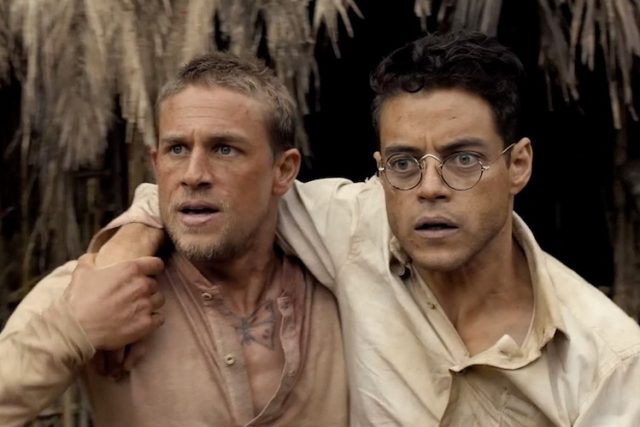
“Papillon” is based on the memoirs of Henri Charrière, a 1930s French safecracker who was sent to an inescapable penal colony from which he subsequently (spoiler alert) escaped. But it’s also based on the 1973 film version of those memoirs (screenwriters Dalton Trumbo and Lorenzo Semple Jr. are officially credited) and hews closely to it. What’s more, director Michael Noer has cast two actors who bear more than passing resemblance to Steve McQueen and Dustin Hoffman, practically begging us to compare the remake to the original.
And guess what? In most ways, Noer’s version improves upon Franklin J. Schaffner’s, which benefited from star power but didn’t feature those stars’ best work. Charlie Hunnam and Rami Malek have more to prove than McQueen and Hoffman did 45 years ago, as does Noer, a Dane making his English-language debut. The remake is a few minutes longer than the original yet feels shorter, more efficient, more engaging, with a screenplay (by “Prisoners” writer Aaron Guzikowski) that brings out the relationship at the story’s heart.
Robust, well-abbed gentleman Henri (Hunnam), called Papillon because of the butterfly tattoo on his chest, is a non-violent thief who was framed for the murder of a pimp. Given his occupation of stealthy skulduggery, it’s no surprise his first thought upon arriving in prison is to escape from it. But the prison is in French Guyana, with a shark-filled ocean on one side and desolate wilderness on the other. Anyone attempting escape will need help from outside parties, which means they will need money.
Louis Dega (Malek), in the same freshman class of prisoners as Papillon, is a wealthy forger with access to plenty of dough — he keeps it hidden in his butt, which was the style at the time — but no way to protect himself from the hardcore inmates who would slice him open and make a withdrawal if given half a chance. Papillon offers to protect Dega in exchange for cash and escape assistance, and they become an odd-couple pair of pals.
The prison has the cruel guards and dehumanizing punishments you’d expect, plus brutal labor requirements and the very real possibility of dying due from disease or injury. The sobering realities of life in a penal colony are presented matter-of-factly (I wasn’t exaggerating about the cutting-you-open thing), and Noer doesn’t shy away from them. But he doesn’t dwell on them, either, and the bleakly compelling story of endurance and strength is really the story of a noble friendship marked by unspoken tenderness. Neither Hunnam nor Malek is a heavyweight actor (yet), but both offer scrappy sincerity.
B (2 hrs., 13 min.; )





